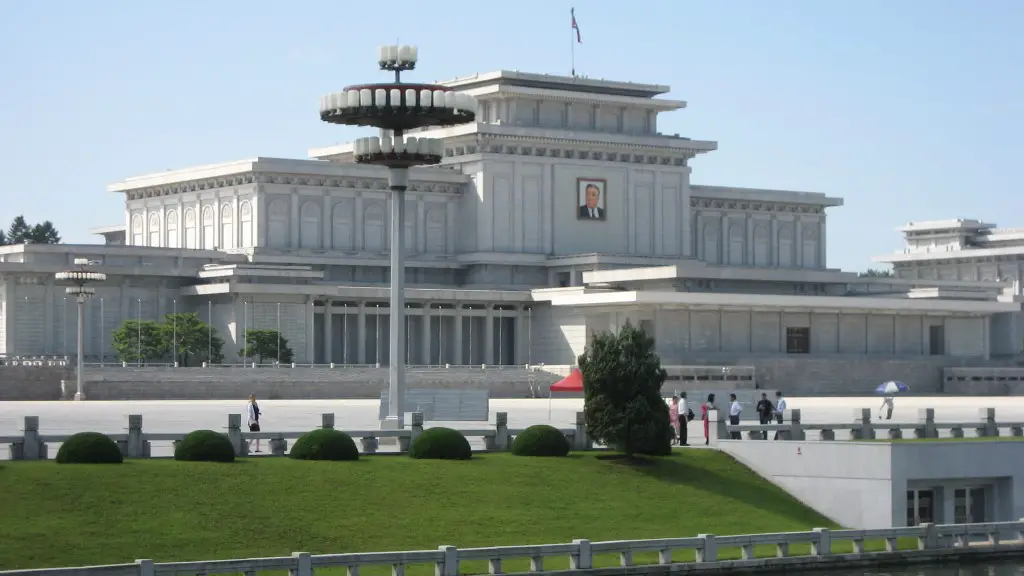Background Information
North Korea is a self-declared nuclear weapon state that left the 1968 Non-Proliferation Treaty (NPT) in 2003. The NPT is an international agreement for the prevention of further spread of nuclear weapons and the promotion of peaceful uses of nuclear energy. North Korea has taken a hard stance against international agreements, and its withdrawal from the NPT signaled its intent to pursue its own nuclear ambitions. This created a crisis situation for the international community, and led to a series of diplomatic talks and sanctions aimed at pressuring North Korea to return to the NPT. In the following years, North Korea continued testing nuclear weapons, furthering tensions with the international community.
Relevant Data and Perspective from Experts
According to experts, North Korea officially announced its withdrawal from the NPT on 10 January 2003. At that time, North Korea was already suspected of pursuing a clandestine nuclear weapons program, and its withdrawal from the international treaty was seen as a violation of the treaty’s terms. North Korea has a history of disregarding international law and agreements, and its withdrawal from the NPT was a marked acceleration of its nuclear ambitions.
The United States and other members of the international community responded swiftly to North Korea’s withdrawal. Diplomatic talks were organized in Beijing in 2003, which North Korea participated in but eventually walked out of without making any commitments to returning to the NPT. In the years to follow, North Korea continued testing nuclear weapons, which prompted a series of diplomatic efforts, sanctions and reprehensions in the international bodies.
Analysis: Causes of Withdrawal
Experts suggest that the withdrawal was primarily motivated by a sense of security. According to some analysts, North Korea viewed itself as too weak to stand up to the global powers, and decided to pursue its own nuclear aspirations as a way to establish itself as a strong nation within the international arena. Additionally, North Korea was concerned that it would be unable to preserve its domestic political system if it followed global norms and standards, and was determined to pursue its own way of rule at the expense of international agreement.
Consequences
The withdrawal from the NPT had a serious impact on the international relations of several countries. The United States, the primary player of the international community, became increasingly hostile towards North Korea, and instituted sweeping sanctions in response. This led to an escalation of tensions between the two countries, and the diplomatic impasse lasted until 2017, when a new round of talks was initiated between the two sides.
In the meantime, North Korea proceeded to test and develop its nuclear weapons, raising fears of a nuclear arms race in the region. Experts warn that the lack of a binding international agreement over the possession of nuclear weapons in the Korean Peninsula poses a threat to regional and world security, and urge the international community to seek a peaceful resolution of the conflict.
Calls for Diplomacy
The international community has reacted to the North Korea crisis in different ways. Most notably, there have been calls for the return to the NPT as a way to ensure peace and security in the region. However, the North Korean government has so far refused to return to the treaty, and continues to promote its own nuclear agenda. Experts suggest that diplomatic and economic pressure are needed in order to persuade North Korea to alter its stance, and to return to the NPT fold.
International Sanctions
In response to the withdrawal from the NPT, numerous UN and US sanctions have been imposed on North Korea. These have been primarily aimed at dissuading North Korea from pursuing its own agenda, and have included trade restrictions and financial penalties. The sanctions have had a significant impact on the North Korean economy, and have been seen as a means to increase pressure on the regime. However, some experts believe that the sanctions are unlikely to be effective in the long-term, and suggest that they should be accompanied by humanitarian and diplomatic dialogue.
Implications for the Region
The withdrawal of North Korea from the NPT has significant implications for both the region and the world. It has heightened tensions between North Korea, the United States and other nations, and increased the threat of nuclear proliferation in the region. It has also raised security concerns and necessitated a high level of preparedness, especially among the nations close to the Korean Peninsula.
Implications for the World
The North Korea crisis has sparked a wider debate about the implications of nuclear weapons for global security. Some experts have argued that the lack of an international agreement over the issue represents a grave threat to the peace and stability of the world. Additionally, the crisis has highlighted the need for nations to come together and address the issue through diplomacy, rather than through sanctions and threats.
Nuclear Tests in North Korea
Since North Korea withdrew from the NPT, it has conducted numerous nuclear tests, raising fears of a nuclear arms race in the region. The sixth and most powerful test was conducted in 2017, and caused an international outcry. In response, more sanctions were imposed on North Korea, but to little effect. Experts believe that the tests are unlikely to sway the international community, and suggest that they are primarily aimed at demonstrating the strength and determination of the North Korean regime.
Diplomatic Solutions
In 2017, a new round of diplomatic talks between North Korea, the United States and other nations were initiated in an attempt to resolve the crisis. These talks were largely successful, and resulted in a joint statement between North Korea and the United States that outlined a denuclearization plan for North Korea. While the details of the plan remain opaque, it is hoped that it will lead to a lasting solution to the crisis and to the eventual return of North Korea to the NPT.


